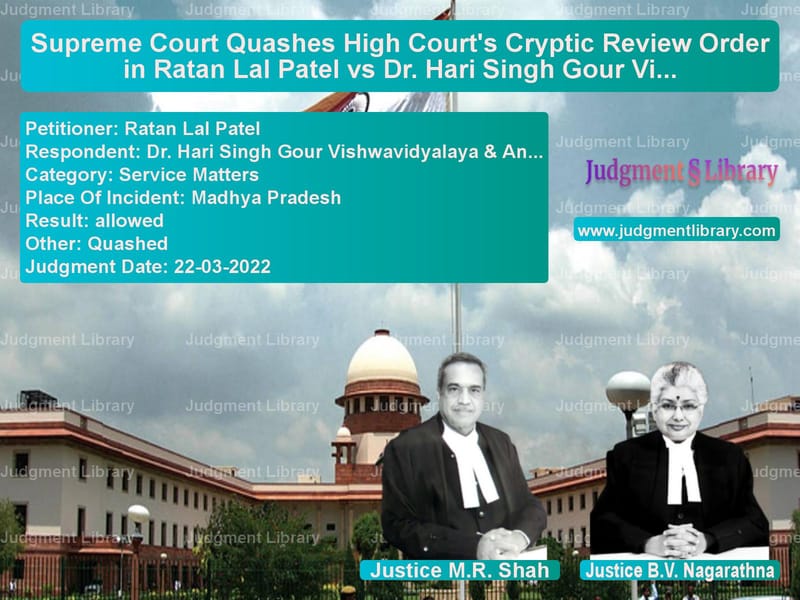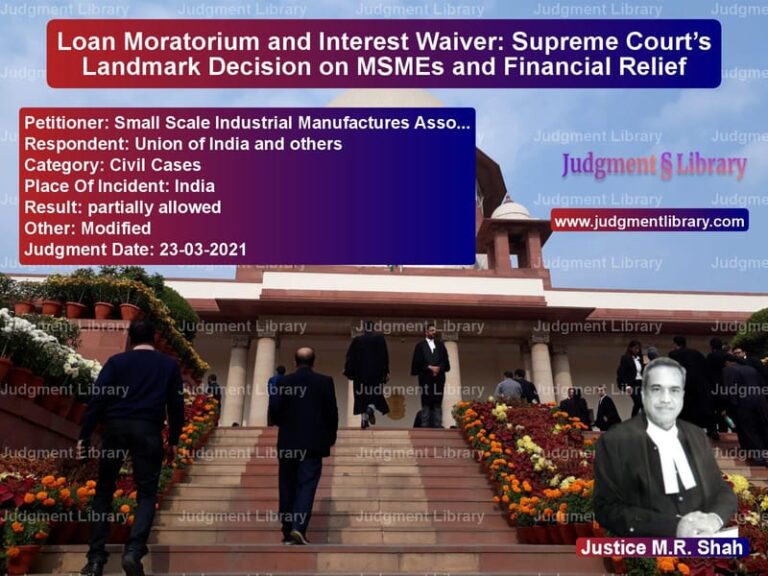Supreme Court Quashes High Court’s Cryptic Review Order in Ratan Lal Patel vs Dr. Hari Singh Gour Vishwavidyalaya
The Supreme Court of India, in its judgment dated March 22, 2022, ruled on the case of Ratan Lal Patel vs Dr. Hari Singh Gour Vishwavidyalaya & Another. The case revolved around the legality of a review order passed by the High Court of Madhya Pradesh, which overturned an earlier judgment regarding the appellant’s retirement age. The Supreme Court quashed the High Court’s review order, citing that it was a cryptic and non-reasoned order.
Background of the Case
The appellant, Ratan Lal Patel, had initially filed Writ Petition No. 17517/2014 before the Madhya Pradesh High Court, challenging his premature superannuation. He sought directions to continue his service until the age of 62 years. The Single Judge of the High Court had allowed his petition, granting him an extended retirement age.
The respondent university, Dr. Hari Singh Gour Vishwavidyalaya, challenged this decision in Writ Appeal No. 748/2017 before the Division Bench. The Division Bench dismissed the appeal on November 10, 2020, thereby upholding the Single Judge’s ruling.
However, the university later filed a Review Petition (No. 1189/2020) before the High Court, seeking reconsideration of the decision. The Division Bench allowed the review and recalled its previous judgment without providing detailed reasons, leading the appellant to approach the Supreme Court.
Petitioner’s Arguments (Ratan Lal Patel)
The appellant argued:
- The High Court’s order allowing the review petition was cryptic and non-speaking, failing to specify any error apparent on the face of the record.
- The review jurisdiction should be exercised only in cases of manifest errors and not as a mechanism for re-examining the merits of a case.
- The High Court’s judgment dated 10.11.2020 was a reasoned order, and there was no legal ground for its recall.
Respondent’s Arguments (Dr. Hari Singh Gour Vishwavidyalaya)
The respondent university contended:
- There was an error apparent on the face of the record, which necessitated reconsideration.
- The review jurisdiction of the High Court was correctly invoked to rectify the mistake.
- The matter required further deliberation, and the earlier order should not be considered final.
Supreme Court’s Observations
The Supreme Court, comprising Justices M.R. Shah and B.V. Nagarathna, analyzed the High Court’s review order and found it to be legally deficient.
On the Requirement of a Reasoned Order
The Court emphasized:
“It cannot be disputed that the review jurisdiction can be exercised only in a case where it is found that there is an error apparent on the face of the record and not otherwise.”
Further, it noted:
“Merely stating that there is an error apparent on the face of the record is not sufficient. It must be demonstrated that, in fact, there was an error.”
On the Lack of Justification for the Review
The Court found that the High Court had simply stated:
“On considering the pleadings, it is noticed that there is apparent error on the face of record which calls for interference.”
The Supreme Court criticized this approach, stating:
“The impugned order allowing the review application is a cryptic, non-reasoned, and non-speaking order.”
Final Verdict
The Supreme Court ruled:
“The impugned order passed by the Division Bench of the High Court dated 13.12.2021 in Review Petition No. 1189/2020 allowing the review application is hereby quashed and set aside.”
However, the Court granted liberty to the High Court to reconsider the review petition, but with a speaking and reasoned order within three months.
Implications of the Judgment
This ruling establishes several important legal principles:
- A review petition must specify the exact error apparent on the record; a general statement is insufficient.
- The courts must provide reasoned and speaking orders when exercising review jurisdiction.
- Decisions already delivered with reasoning should not be casually recalled.
- Higher courts must ensure that procedural fairness is maintained in review applications.
Conclusion
The Supreme Court’s ruling in Ratan Lal Patel vs. Dr. Hari Singh Gour Vishwavidyalaya reinforces the importance of judicial discipline in review petitions. It ensures that review jurisdiction is exercised with due diligence and prevents arbitrary recall of reasoned judgments.
Petitioner Name: Ratan Lal Patel.Respondent Name: Dr. Hari Singh Gour Vishwavidyalaya & Another.Judgment By: Justice M.R. Shah, Justice B.V. Nagarathna.Place Of Incident: Madhya Pradesh.Judgment Date: 22-03-2022.
Don’t miss out on the full details! Download the complete judgment in PDF format below and gain valuable insights instantly!
Download Judgment: ratan-lal-patel-vs-dr.-hari-singh-gour-supreme-court-of-india-judgment-dated-22-03-2022.pdf
Directly Download Judgment: Directly download this Judgment
See all petitions in Employment Disputes
See all petitions in Public Sector Employees
See all petitions in Judgment by Mukeshkumar Rasikbhai Shah
See all petitions in Judgment by B.V. Nagarathna
See all petitions in allowed
See all petitions in Quashed
See all petitions in supreme court of India judgments March 2022
See all petitions in 2022 judgments
See all posts in Service Matters Category
See all allowed petitions in Service Matters Category
See all Dismissed petitions in Service Matters Category
See all partially allowed petitions in Service Matters Category







